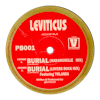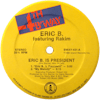It’s hard to condense 4hero’s history and influence into a brief paragraph but suffice to say their early releases are a prominent part of the foundations of drum & bass, as is their label Reinforced. Best known as the duo of Dego and Marc Mac, 4hero’s first incarnation was as a foursome with Iain Bardouille and Reinforced co-founder, Gus Lawrence. “Mr Kirk’s Nightmare” is a decidedly London take on dance music, replacing the euphoric sounds that had been so popular in raves with an edgy, grimier approach to huge effect.
Gus: We were at college together, and we were all into hip-hop. Marc had a drum machine and I asked to borrow it; I started programming it at home and it was something that came to me quite easily. I got drafted into a hip-hop group called Trouble, bought a sampler, and set up a studio in my bedroom. I was pretty much self-taught. Marley Marl was my favourite producer back in the day; everyone wanted to be like him and make stuff like the Juice Crew records. Mantronix too, he was great at drum programming but I thought I was as good as him. I liked putting as many breaks together as I could without them clashing.
I produced some tracks on MC Mell’O’s first album and they were all uptempo so when it came to doing the first Reinforced releases, I was using the same method. By that time I had a really big catalog of breaks. When I was in Trouble, DJ Pogo gave me a whole bunch of his records, and Marc and Dego had loads of rare groove and all the rest of it, so they gave me records and I had a big library to draw from which made things easier when I was making a tune. Marc and Dego’s musical scope was much more vast than mine. I was a hip-hop head through and through, which was anti- house music. When we started working together, they introduced me to house music. We had a radio station called Strong Island and we’d make the jingles in my bedroom studio. Iain came down too and we wouldn’t rely on the library of breaks I already had, they’d bring stuff with them.
I had loads of hip-hop productions that weren’t being released, and I’d tried labels like Rhythm King and Jive, so Marc suggested we should start our own label, which ended up being called Reinforced as my production name was Reinforced Gus. The experimentation that Marc brought along meant that our original idea of doing hip-hop records went somewhere else, and became drum & bass. The first record we released was “All B 3,” which we only did 700 copies on a white label. The second release was a five-track EP called Combat Dancin’ which included “Mr. Kirk’s Nightmare.”
We didn’t make that track in one day. I had that b-boy mentality that you should try and do things on the drum machine and on the sampler that hadn’t been done before. That’s how I ended up with the loop going backwards and forwards and staying in sync. I think Iain did the bassline and once we had something we liked I could embellish it after the others had gone home. The vocal sample was in a bunch of records that Marc bought round. I put it on the record and didn’t tell the others until I played it to them. Marc wasn’t happy with it and wanted to take it off but I thought that as it was controversial, it would sell records.
If you think about the 4hero guidebook, rule number one was to do something different. That ethos stayed with Reinforced and spread through the artists. “Mr. Kirk” wasn’t a house record; it didn’t have a genre at the time. We did what we liked, and we thought other people would like it. We didn’t make it with clubs or DJs in mind, just ourselves and the record shops, although I remember we thought Steve Jackson would like it and he championed it on Kiss FM. We pressed up the first 1,000 copies and sold them in one weekend. In those days all the pirate radio DJs got their music from the record shops so we took it to Zoom in Camden and they took 250 copies. Blackmarket took 250, and two other shops took 250. They sold out and we went back a week later with another 1,000 copies, and they all sold too. That was all done out of the back of my mum’s Nissan! It was popular straight away. The shops didn’t normally take that many copies at once; they might take a box of 30. They’d play it while we were in there and people would start asking what it was. We hadn’t experienced that before as the first release did 700 over about two months, and half of that was probably given away as promos. There was a big difference, and we knew we were onto something.
Pacific Records contacted us and wanted to distribute it as a proper single, so we released it as a three-track 12-inch, which is how there came to be 2,500 copies of [catalogue number] RIVET 1202, which was the five-track EP, but 28,000 copies of RIVET 1203. That should have set up the label financially, but then Pacific went bust and didn’t pay us any money, apart from one cheque which bounced. We had pressed up the amount of records they asked for so we owed the pressing plant £15,000. In addition to that, I’d invoiced Pacific for the money they owed us, and that was on their books when they filed for bankruptcy. I’d included VAT, but I didn’t really know how that worked at the time and ended up with the taxman knocking on my parents’ door saying I owed them £7,000! I didn’t have that money and it got sorted out eventually.
Fortunately, the pressing plant knew about our situation so they gave us some more credit to press records so we could earn the money to pay them back. They’d seen we’d had a hit so would be good for it and had faith in us. We started making records under different names so we could put as much music out as possible to pay back the money. That was what set up Reinforced Records as we ended up putting out a new release every few weeks. We had Tek 9, Manix, more 4hero records, all selling twenty-five to thirty thousand each. There was a Music Week article that said the most successful independent labels for the first quarter of 1991 were Virgin, Jive and Reinforced. We didn’t really get too much interest from major labels at the time though. I think maybe they were afraid of us, being four Black guys from Northwest London. It was easier for them to approach Suburban Base or Richard Russell at XL Records, who had both started up around the same time.
We recognized when people were sampling us and doing patterns and arrangements that we’d done, but we weren’t aware of our impact then like we are now. We just thought people were biting our style. There were a couple of occasions where there were incidents with other labels, but you can’t put them in print!



